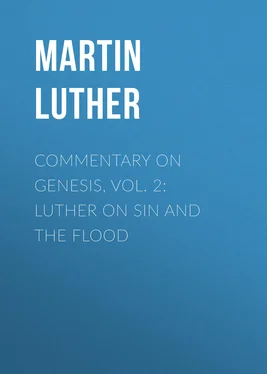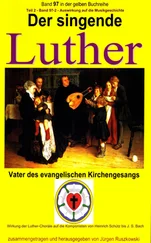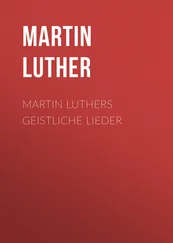Martin Luther - Commentary on Genesis, Vol. 2 - Luther on Sin and the Flood
Здесь есть возможность читать онлайн «Martin Luther - Commentary on Genesis, Vol. 2 - Luther on Sin and the Flood» — ознакомительный отрывок электронной книги совершенно бесплатно, а после прочтения отрывка купить полную версию. В некоторых случаях можно слушать аудио, скачать через торрент в формате fb2 и присутствует краткое содержание. Жанр: foreign_prose, foreign_religion, Философия, foreign_psychology, foreign_antique, на немецком языке. Описание произведения, (предисловие) а так же отзывы посетителей доступны на портале библиотеки ЛибКат.
- Название:Commentary on Genesis, Vol. 2: Luther on Sin and the Flood
- Автор:
- Жанр:
- Год:неизвестен
- ISBN:нет данных
- Рейтинг книги:4 / 5. Голосов: 1
-
Избранное:Добавить в избранное
- Отзывы:
-
Ваша оценка:
- 80
- 1
- 2
- 3
- 4
- 5
Commentary on Genesis, Vol. 2: Luther on Sin and the Flood: краткое содержание, описание и аннотация
Предлагаем к чтению аннотацию, описание, краткое содержание или предисловие (зависит от того, что написал сам автор книги «Commentary on Genesis, Vol. 2: Luther on Sin and the Flood»). Если вы не нашли необходимую информацию о книге — напишите в комментариях, мы постараемся отыскать её.
Commentary on Genesis, Vol. 2: Luther on Sin and the Flood — читать онлайн ознакомительный отрывок
Ниже представлен текст книги, разбитый по страницам. Система сохранения места последней прочитанной страницы, позволяет с удобством читать онлайн бесплатно книгу «Commentary on Genesis, Vol. 2: Luther on Sin and the Flood», без необходимости каждый раз заново искать на чём Вы остановились. Поставьте закладку, и сможете в любой момент перейти на страницу, на которой закончили чтение.
Интервал:
Закладка:
149. But I return to the text before us. Cain is an evil and wicked man, and yet, in the eyes of his parents, he is a divine possession and gift. Abel, on the contrary, is in the eyes of his parents nothing; but in the eyes of God he is truly a righteous man; an appellation with which also Christ honors him when he calls him "righteous Abel"! Mt 23, 35. This divine judgment concerning Abel, Cain could not endure, and, therefore, he thought that by murder not only the hatred against his brother could be satisfied, but also his birthright be retained. But he was far from thinking that was sin; as the first-born he thought he had exercised his right. He killed Abel, not with a sword, as I think, but with a club or a stone, for I hold that there were as yet no iron weapons.
150. After the murder, Cain remained unconcerned, for he thought the deed could be concealed by hiding the body, which he buried, or perhaps cast into a river, thinking that thus it would surely remain undiscovered by his parents.
When Abel, however, had been from home a longer time than had been his habit, the Holy Spirit prompted Adam to inquire of Cain concerning Abel, saying, "Where is Abel thy brother?" The above-mentioned utterance of Adam, "If not, sin lieth at the door," was a prophecy which now began to come true. Cain thought he had laid his sin to rest, and all would thus remain hidden. And true it was that his sin did lie at rest, but it lay at rest "at the door." And who opens the door? None other than the Lord himself! He arouses the sleeping sin! He brings the hidden sin to light!
151. The same thing must come to pass with all sinners. For, unless by repentance you first come to God, and yourself confess your sin to God, God will surely come to you, to disclose your sin. For God cannot endure that any one should deny his sin. To this fact the psalmist testifies: "When I kept silence, my bones wasted away through my roaring all the day long. For day and night thy hand was heavy upon me; my moisture was changed as with the drouth of summer." Ps 32, 3-4. For, although sin has its sleep and its security, yet that sleep is "at the door"; it cannot long last, and the sin cannot remain hidden.
152. When Moses introduces Jehovah as speaking, I understand him to mean, as above, that it was Adam who spoke by the Holy Spirit in the place of God, whom he represented in his relation as father. The expression of the Holy Spirit, therefore, is intended to set forth the high authority of parents; when children dutifully hear and obey these, they hear and obey God. And I believe Adam knew by the revelation of the Holy Spirit that Abel had been slain by his brother; for his words intimate the commission of murder at a time when Cain still dissembled as to what he had done.
V. HOW CAIN WAS PUNISHED FOR HIS MURDER
153. If Eve overheard these words, what think you must have been the state of her mind! Her grief must have been beyond all description. But the calamity was brought home to Adam with even greater force. As he was the father, it fell to him to rebuke his son and to excommunicate him for his sin. Since, according to the ninth chapter, the law concerning the death-penalty for murderers was not promulgated until afterward when the patriarchs beheld murder becoming alarmingly frequent, Adam did not put Cain to death, but safeguarded his life in obedience to the prompting and direction of the Holy Spirit; still, it is a fact not to be gainsaid that the punishment ordained for him and all his posterity was anything but light. For in addition to that curse upon his body he suffered excommunication from his family, separation from the sight of his parents and from the society of his brothers and sisters, who remained with their parents, or in the fellowship of the Church.
154. Now, Adam could not have done all this, nor could Eve have heard it without indescribable anguish. For a father is a father, and a son is a son. Gladly would Adam have spared his son and retained him at home, as we now sometimes see murderers become reconciled to the brothers of their victims. But in this case no place was left for reconciliation. Cain is bidden at once to be a fugitive upon the face of the earth. The pain of the parents was doubled in consequence. They see one of their sons slain, and the other excommunicated by the judgment of God and cut off forever from the fellowship of his brethren.
155. Moreover, when we here speak of excommunication from the Church, it stands to reason that not our houses of worship, built in magnificent style and ample proportions out of hewn stone, are meant. The sanctuary, or church, of Adam was a certain tree, or a certain little hill under the open heaven, where they assembled to hear the Word of God and to offer their sacrifices, for which purpose they had erected altars. And when they offered their sacrifices and heard the Word, God was present, as we see from the experience of Abel.
Also elsewhere in the sacred story, mention is made of such altars under the open heaven, and of sacrifices made upon them. And, if we should come together at this day under the open sky to bend our knees, to preach, to give thanks, and to bless each other, a custom would be inaugurated altogether beneficial.
156. It was from a temple of this kind and from such a church, not a conspicuous and magnificent church at a particular place, that Cain was cast out. He was thus doubly punished; first, by a corporal penalty, because the earth was accursed to him, and secondly, by a spiritual penalty, because by excommunication, he was cast out from the temple and the church of God as from another paradise.
157. Lawyers also have drawn upon this passage, and quite properly brought out the fact that Jehovah first investigated the matter and then passed sentence. Their application is, that no one should be pronounced guilty until his case has been tried; until he has been called to the bar, proved guilty and convicted. This, according to a previous statement, was also done with Adam: "The Lord God called unto Adam, and said unto him. Where art thou?" Gen 3, 9. And further on: "I will go down now, and see whether they have done altogether according to the cry of it, which is come unto me; and if not, I will know," Gen 11, 5; 18, 21.
158. However, dismissing the matter in its bearings upon public life, let us view its more attractive theological features. The element of doctrine and of hope is found in the fact that Jehovah inquires concerning the dead Abel. Clearly there is pointed out to us here the truth of the resurrection of the dead. God declared himself to be the God of Abel, although now dead, and he inquired for the dead, for Abel. Upon this passage we may establish the incontrovertible principle that, if there were no one to care for us after this life, Abel would not have been inquired for after he was slain. But God inquires after Abel, even when he had been taken from this life; he has no desire to forget him; he retains the remembrance of him; he asks: "Where is he?" God, therefore, we see, is the God of the dead. My meaning is that even the dead, as we here see, still live in the memory of God, and have a God who cares for them, and saves them in another life beyond and different from this corporal life in which saints suffer affliction.
159. This passage, therefore, is most worthy of our attention. We see that God cared for Abel, even when dead; and that on account of the dead Abel, he excommunicated Cain, and visited him, the living, with destruction in spite of his being the first-born. A towering fact this, that Abel, though dead, was living and canonized in another life more effectually and truly than those whom the pope ever canonized! The death of Abel was indeed horrible; he did not suffer death without excruciating torment nor without many tears. Yet it was a blessed death, for now he lives a more blessed life than he did before. This bodily life of ours is lived in sin, and is ever in danger of death. But that other life is eternal and perfectly free from trials and troubles, both of the body and of the soul.
Читать дальшеИнтервал:
Закладка:
Похожие книги на «Commentary on Genesis, Vol. 2: Luther on Sin and the Flood»
Представляем Вашему вниманию похожие книги на «Commentary on Genesis, Vol. 2: Luther on Sin and the Flood» списком для выбора. Мы отобрали схожую по названию и смыслу литературу в надежде предоставить читателям больше вариантов отыскать новые, интересные, ещё непрочитанные произведения.
Обсуждение, отзывы о книге «Commentary on Genesis, Vol. 2: Luther on Sin and the Flood» и просто собственные мнения читателей. Оставьте ваши комментарии, напишите, что Вы думаете о произведении, его смысле или главных героях. Укажите что конкретно понравилось, а что нет, и почему Вы так считаете.












